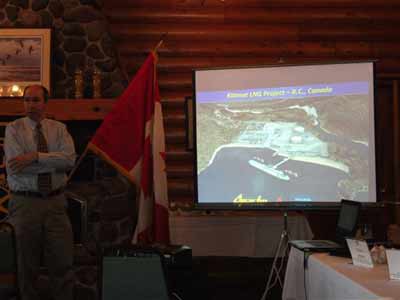
Robert Kimball, Jr. Introduced our June 6th, 2011 guest speaker, Jim Balcomb of Apache Canada. Jim is from N.B.; he currently lives in Grand Bay (right behind hole number 2 at the golf course). Jim has been with Apache for eight months and on contract for public and government relations. He has a background in economic development, an MBA and a Bachelors Degree in Chemistry. Last but not least, he is a former Rotarian with the Saint John Club...
Jim started by explaining the decision that made the local headlines on Wednesday. Apache was under contract with Corridor to decide by Wednesday whether or not they would move on to phase two of the shale gas extraction. Their first commitment was for $25,000,000 to drill the first well. They declined to move on with the second phase. Shale gas is a natural gas that is under high pressure and trapped within the shale. It requires high pressure to be extracted from the shale. The shale rock in this area is 1km thick and is among the densest on the planet - believed to be the largest on the continent. They use a powerful combination of water, sand and guar gum to extract the gas. Natural gas had helped reduce our dependence on oil imported from other countries around the world, and this is a massive priority for the U.S.
Although Apache has left, there are six other large companies that have shown interest in continuing the efforts in this area. The industry is not going anywhere and will continue to be in N.B. Corridor is one of the companies still drilling in N.B. Apache has a lot of interest in the western provinces and B.C. in particular. B.C. has the largest deposit to date in North America. Apache’s results were not favourable in their tests here in N.B., but that is to be expected according to professionals in this industry. Therefore they decided to move their efforts to B.C. and concentrate there for now.
Corridor is scheduled to drill two more wells using liquid propane in the fall. Propane can be but is not always necessarily separated from the natural gas extracted from the shale. Jim’s main message was that there is gas here. Apache started in the U.S. in 1954.
